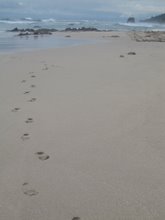Everyone who loses somebody wants revenge on someone, or God if they can’t find anyone else.
In Africa, the Ku believe the only way to end grief is to save a life. If someone is murdered, a year of mourning is ended by a ritual called “the drowning man trial”. There is an all-night party beside a river. At dawn, the killer is put in a boat and taken out to the water and is dropped by his bound so he can’t swim. The family of the dead then has to make a choice: they can let him drown, or they can swim out and save him. The Ku believe, that if the family lets the killer drown, they’ll have justice, but spend the rest of their lives in mourning. But if they save him, if they admit that life isn’t always just, that very act can take away their sorrow.
Anger is the lazy form of grief.
I believe, that this applies to any type of grief, not only a death of a loved one, although this would be the most extreme, but any type of loss, when we feel that something that is not part of our plan, that we feel is unjust, happens to us.
I observe, that anger is the lazy form of a lot of other emotions: jealousy, insecurity, feeling loss of control, among others.
It is the first and easiest emotion for our heart and head to get to, when we are either trying to mask the real emotion, or simply afraid to look into ourselves and admit it.
Accept it.
We may not ever have to forgive, but if we truly accept that things happen and are the way they are for the best, that is when we can really move on.
Ask the Ku. Their ancestors' old tradition, protected solely by its own ignorance to the modern world, may seem primitive; but the underlying premise of its lessons, is based on nothing but conscious growth, self-awareness and evolution. They are the oldest form of insight into the human psyche, of learning how to live our lives without regrets and negativity.
Subscribe to:
Post Comments (Atom)


No comments:
Post a Comment